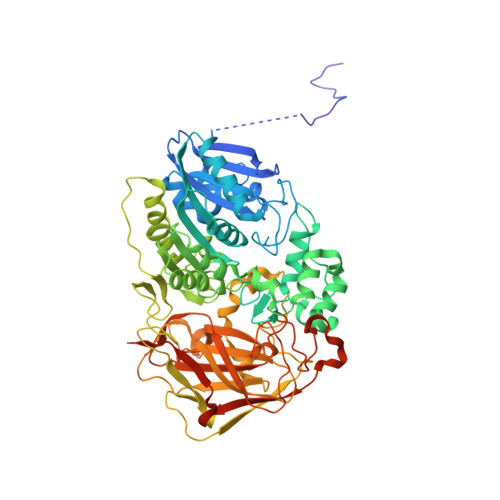Acetobacter turbidans alpha-amino acid ester hydrolase: how a single mutation improves an antibiotic-producing enzyme.
Barends, T.R., Polderman-Tijmes, J.J., Jekel, P.A., Williams, C., Wybenga, G., Janssen, D.B., Dijkstra, B.W.(2006) J Biol Chem 281: 5804-5810
- PubMed: 16377627
- DOI: https://doi.org/10.1074/jbc.M511187200
- Primary Citation of Related Structures:
1NX9, 1RYY, 2B4K, 2B9V - PubMed Abstract:
The alpha-amino acid ester hydrolase (AEH) from Acetobacter turbidans is a bacterial enzyme catalyzing the hydrolysis and synthesis of beta-lactam antibiotics. The crystal structures of the native enzyme, both unliganded and in complex with the hydrolysis product D-phenylglycine are reported, as well as the structures of an inactive mutant (S205A) complexed with the substrate ampicillin, and an active site mutant (Y206A) with an increased tendency to catalyze antibiotic production rather than hydrolysis. The structure of the native enzyme shows an acyl binding pocket, in which D-phenylglycine binds, and an additional space that is large enough to accommodate the beta-lactam moiety of an antibiotic. In the S205A mutant, ampicillin binds in this pocket in a non-productive manner, making extensive contacts with the side chain of Tyr(112), which also participates in oxyanion hole formation. In the Y206A mutant, the Tyr(112) side chain has moved with its hydroxyl group toward the catalytic serine. Because this changes the properties of the beta-lactam binding site, this could explain the increased beta-lactam transferase activity of this mutant.
Organizational Affiliation:
Laboratories of Biophysical Chemistry and Biochemistry, University of Groningen, Nijenborgh 4, 9747 AG Groningen, The Netherlands.














